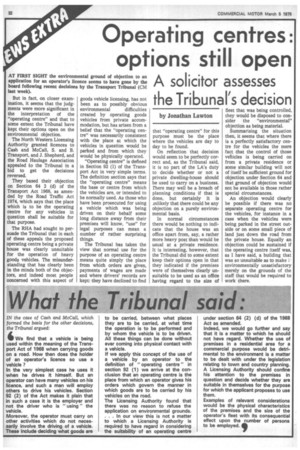What the Tribunal said.
Page 34

If you've noticed an error in this article please click here to report it so we can fix it.
IN the case of Cash and McCall, which formed the basis for the other decisions, the Tribunal argued: We find that a vehicle is being used within the meaning of the Transport Act of 1968 when carrying goods on a road. How then does the holder of an operator's licence so use a vehicle ?
In the very simplest case he uses it when he drives it himself. But an operator can have many vehicles on his licence, and such a man will employ others to drive his vehicles. Section 92 (2) of the Act makes it plain that in such a case it is the employer and not the driver who is " using " the vehicle.
Moreover, the operator must carry on other activities which do not necessarily involve the driving of a vehicle. These include deciding what goods are to be carried, between what places they are to be carried, at what time the operation is to be performed and by whom the vehicle is to be driven. All these things can be done without ever coming into physical contact with a vehicle.
If we apply this concept of the use of a vehicle by an operator to the definition of "operating centre" in section 92 (1) we arrive at the conclusion that an operating centre is the place from which an operator gives his orders which govern the manner in which goods are to be carried by his vehicles on the road.
The Licensing Authority found that there was no reason to refuse the application on environmental grounds.
. . In our view this is not a matter to which a Licensing Authority is required to have regard in considering the suitability of an operating centre under section 64 (2) (d) of the 1968 Act as amended.
Indeed, we would go further and say that it is a matter to which he should not have regard. Whether the use of premises in a residential area for a commercial purpose would be detrimental to the environment is a matter to be dealt with under the legislation relating to town and country planning. A Licensing Authority should confine his attention to the premises in question and decide whether they are suitable in themselves for the purpose for which the applicant proposes to use them.
Examples of relevant considerations would be the physical characteristics of the premises and the size of the operator's fleet with its consequential effect upon the number of persons to be employed.




















































































































































